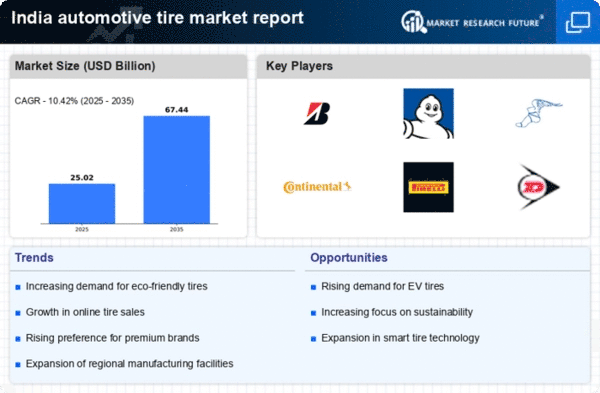Increasing Urbanization
Urbanization in India significantly influences the automotive tire market, as more individuals migrate to urban areas seeking better opportunities. This trend leads to a rise in vehicle ownership, with urban centers experiencing a growth rate of approximately 3% annually in vehicle registrations. Consequently, the demand for tires escalates, as urban dwellers require reliable and durable options for daily commuting. The automotive tire market must adapt to unique challenges posed by urban environments, such as potholes and varying road conditions. Additionally, the increasing preference for two-wheelers in urban settings, which constitutes about 40% of total vehicle sales, further propels the demand for specialized tires. As urbanization continues, the automotive tire market is likely to evolve, focusing on innovative solutions to meet the needs of urban consumers.
Rising Vehicle Production
The automotive tire market in India experiences a notable boost due to the increasing production of vehicles. In recent years, the automotive sector has witnessed a compound annual growth rate (CAGR) of approximately 10%, leading to heightened demand for tires. As manufacturers ramp up production to meet consumer needs, the automotive tire market is poised for growth. The expansion of both passenger and commercial vehicle segments contributes to this trend, with the latter expected to account for around 30% of total vehicle production by 2025. This surge in vehicle output directly correlates with the demand for high-quality tires, thereby driving the automotive tire market. Furthermore, the introduction of new models and variants by manufacturers enhances the diversity of tire requirements, further stimulating market dynamics.
Growth of E-commerce and Delivery Services
The rise of e-commerce and delivery services in India has a profound impact on the automotive tire market. With the e-commerce sector projected to reach $200 billion by 2026, the demand for logistics and delivery vehicles is surging. This trend necessitates a corresponding increase in tire production, particularly for commercial vehicles. The automotive tire market must cater to the specific requirements of delivery fleets, which often prioritize durability and performance under varying load conditions. Additionally, the growth of last-mile delivery services, which has seen a 25% increase in demand, further emphasizes the need for specialized tires. As businesses adapt to the changing landscape of consumer behavior, the automotive tire market is likely to see innovations tailored to enhance the efficiency and safety of delivery vehicles.
Technological Integration in Manufacturing
The automotive tire market in India is witnessing a transformation. This transformation is driven by technological integration in manufacturing processes. Advancements such as automation and artificial intelligence are enhancing production efficiency and quality control. Manufacturers are increasingly adopting smart technologies to monitor tire performance and optimize production lines, which could lead to a reduction in manufacturing costs by up to 15%. This shift not only improves the overall quality of tires but also allows for the introduction of innovative products that meet evolving consumer demands. Furthermore, the integration of data analytics enables manufacturers to better understand market trends and consumer preferences, thereby aligning their offerings with market needs. As technology continues to evolve, the automotive tire market is likely to benefit from enhanced operational efficiencies and product innovations.
Government Initiatives for Infrastructure Development
Government initiatives aimed at infrastructure development play a crucial role in shaping the automotive tire market in India. With substantial investments in road construction and maintenance, the quality of road networks is expected to improve significantly. This enhancement is likely to increase vehicle usage, thereby driving demand for tires. The government has allocated approximately $10 billion for infrastructure projects in the current fiscal year, which is anticipated to bolster the automotive sector. Improved road conditions not only enhance vehicle performance but also influence consumer preferences for high-quality tires that can withstand diverse driving conditions. As infrastructure development progresses, the automotive tire market is expected to adapt, focusing on products that cater to the needs of consumers navigating improved roadways.
















